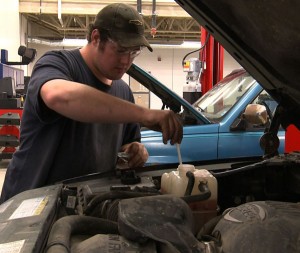By Katrina Geenevasen
 [1]
[1]BELLEVILLE. There could be a shortage of skilled workers in the future, but Loyalist College students are being trained to fill the gap. Photo by Katrina Geenevasen.
In 10 years, you may have trouble tracking down a mechanic if your car breaks down on the side of the road.
According to the Conference Board of Canada, it is estimated that there could be shortfall about one million skilled workers by 2020 due to an aging population and declining birth rates.
Skills Canada says in the next two decades, 40 percent of new jobs will be in the skilled trades and technologies.
In 1998, that number was less than 20 percent.
Garrett Schultens, professor and coordinator of electrical skills at Loyalist College, agrees there could be problems on the horizon.
“Absolutely there will be a problem,” said Schultens. “We’ll be facing a skills shortage in electrical, in plumbing, heating, and air conditioning because the people coming out of the system haven’t developed the skills to get a job.”
Steve Cook is an automotive technician professor at Loyalist College. He too feels there could be a shortage in the future.
“I don’t think we’ll have a shortfall of ‘tradespeople’, because we always have tradespeople that are the DIY, the fly-by-nights, the kind of guy that does work in the backyard or the self-professed electricians that do their own stuff in the house…there’s always those tradespeople. But I think skilled tradespeople is where we’re going to lack.”
Some feel skills-based jobs are demeaning. But to Loyalist students, tradespeople deserve credit where credit is due.
“I have a lot of respect for people in the trades,” said Jake Magistrale, an automotive technician student at Loyalist College. “It takes a really intelligent person to take something apart, figure out how it works, and put it back together. It’s not as easy as it sounds.”
The problem could be traced back to the public school system.
“In high school, I don’t think there is enough emphasis placed on hands-on skills,” said Schultens. “I think academics are highly valued, and hands-on skills are sort of undervalued.”
T.J. Newlands is in the automotive technician program at Loyalist College.
He said developing hands-on skills as a child is important.
“There’s certain people that you can tell they’ve never turned a screwdriver in their life, and they’re trying to be a mechanic, which is great, I hope it works out for them. But I think that there’s this fundamental basis that you learn as a child. It’s a skill that you develop when you’re very young.”
John Ostapuk teaches a business management class to future auto technicians at Loyalist College. He says children are not getting the hands-on opportunities they should be when they are young.
“What is recess today? What programs are they providing for the children to enhance some kind of a skill program? There isn’t any,” said Ostapuk. “It’s because of the way our society is being groomed. There’s this whole level of skills training lacking.”
Ostapuk compares the trend to a vacuum.
“We’re being sucked into this environment, and this whole level of skills training is disappearing because there is no exposure to it.”
Schultens has similar feelings regarding the public education system.
“I think a lot of the students are really missing an opportunity. I think that things have to begin to happen at the public school level. We really have to introduce shop classes and hands-on skills back into shop classes. I think that’s where this issue starts, is in school. And as a society, we’ve got to start to value hands-on skills.”
Schultens said in some cases, students entering college programs don’t even know how to use a simple hand tool.
“Literally, sometimes, they don’t even know which end of a screwdriver to grab,” said Schultens.
While schools may partly be to blame, it could have something to do with the expectations of parents as well.
Magistrale said he was bound for university, but is thankful he ended up in the automotive program.
“It’s basically more what my father wanted me to do,” said Magistrale. “When it came down to it, he thought computers and things like that were the way of the future, and now he’s kind of having trouble finding a job in that field because it’s sort of flooded.”
Classmates share Magistrale’s feelings.
Newlands said he chose to work in the trades because of the ongoing demand.
“I chose trades because I feel like there’s always going to be a demand for careers. No matter where you go, there is always going to be a car that needs to be worked on. So personally, that’s why I chose trades over anything else.”